Text


This also. by the way.

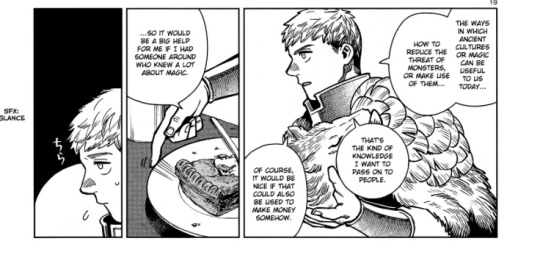
THE SAME GLANCE……… 😭
(Translation for the Kabru comic from Laikabu)
109 notes
·
View notes
Text
Due to being in the process of Moving with Unexpected Extra Steps I haven’t been able to watch the last 2 episodes so it’s funny to see ppl nitpicking (understandable) small differences. I too am sorry about Kabru’s expressions and Falin’s tits 😔
#excited for the episodes in general to be clear. just funny to see the little stuff people are disappointed in w no context#dunmeshi does bring it out of people tho. I get it#everyone has at least one specific detail that encapsulates the emotions of a whole chapter or character or arc for them#a load-bearing panel. if you will. and the anime won’t always get ‘em right
15 notes
·
View notes
Text
So my take on the Marcille & Falin maturity timeline is that Marcille was markedly more mature than Falin at the start. Her first interaction with Falin (as well as the ages they look to me visually) reads very “slightly older kid looking out for slightly younger kid that they feel More Mature than.” So like, maybe early-to-mid-teens ish, developmentally? Just old enough that she viewed herself as not-a-kid the way Falin was.
But the thing is that Falin catches up to her, and Falin outpaces her. Falin hits adulthood before Marcille does, and Marcille still kind of clings to the “I’m older, she’s a kid” label. It’s part of why Marcille frames Falin leaving as Laios “stealing her away.” Because choosing to leave is something an adult does, and being stolen away is something that happens to a kid (simplistic, but I think Marcille’s logic about this IS kind of simplistic).
There is then another time jump, and Marcille catches up to Falin. She crests over that line while they are apart, and they reunite as adults. Marcille still holds on to a bit of that “she’s a kid” attitude towards Falin, but they do start to build a new kind of relationship, especially after the events of the story force Marcille to confront that Falin isn’t a kid anymore.
And what’s important about this is that Marcille wasn’t supposed to have that kind of a friendship. She grows up at a different rate than EVERYONE around her. But she happened to meet Falin at the right time, and they happened to bounce around each other in the right way. It’s messy, and not perfectly in sync, but Marcille does have a friend who kind of keeps pace with her, at least for a while.
103 notes
·
View notes
Text
Kabru, impossible mutual understanding & unknowable objects
Despite his concerted and constant efforts to understand other people, it’s established in a few extras that Kabru believes that true mutual understanding between certain different races is impossible. Specifically, between long-lived and short-lived races, and between humans and demi-humans. Partially, we can trace this conviction back to specific hang-ups caused by his life; the trauma of the Utaya disaster, prejudices he carries from his childhood, and his experience of racism among the elves. In this “little” essay, I’m gonna discuss how I think those experiences formed this belief, how it comes out in his actions, and how some of his actions seem to contradict it. The question of whether it’s possible to reach mutual understanding with other living beings despite our differences is one of the core themes of the manga, and I’ll also touch on how this aspect of Kabru’s character links to that.
Seeking understanding
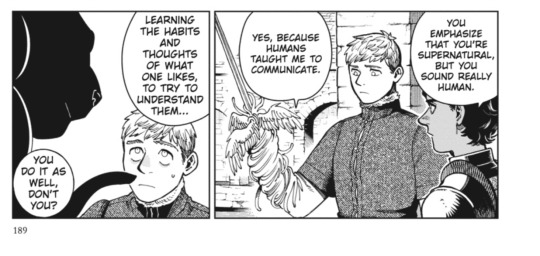
Kabru is a character who devotes a huge amount of time and effort to understanding people, and he is very good at it. In his internal monologue, we can tell how advanced and complex his skills of analysis are. He is able to read a huge amount of information just from looking at people's faces and body language.


People are, to him, what monsters are to Laios. This is something that's been expanded on at length in other, excellent meta. It's the fact that they're foils; it's the fact that Kabru is also very easy to read as autistic, with a special interest which is the opposite and parallel of Laios'. It's something that came out of trauma and alienation, as Laios' special interest in monsters also began as a coping mechanism.
The complicated origin of this "love" for monsters and for people comes through, I think, in the fact that one of the places we see both characters use their fixation is in being very, very good at killing the thing that they love. This also ties into the idea that loving something isn't even remotely mutually exclusive with using it to sustain your own survival; using it for your own purposes; hurting it or killing it. Love can be, and often is, violent, possessive and consumptive. This understanding is part of what makes Kui's depiction of interpersonal relationships so compelling to me.
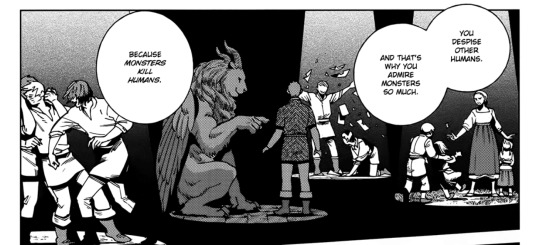
While Laios fixated on monsters and animals to seek a place of escape, in both his imagination and his self-image, from the humans who he couldn't understand and who couldn't understand him, Kabru seems to have fixated on understanding people in order to navigate the complex, socially marginal places that he has been forced into throughout his life. As an illegitimate child raised by a single mother with an appearance that marked him out as different to the point his father's family wanted to kill him, and a tallman child raised among elves who didn't treat him as fully human and wanted him to perform gratefulness for that treatment – treatment that, after he met Rin at age 9, he certainly always understood could be a lot worse – his ability to work out what people wanted from him, whether they were friendly or hostile or had ulterior motives, wasn’t just an interest. It will have been an essential skill.
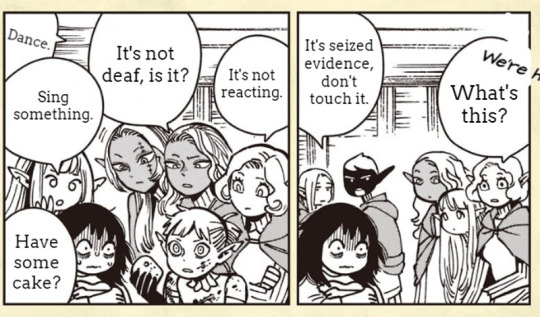
Milsiril, I think, was a flawed parent who tried to do her best by Kabru and did a lot of harm to him despite her best intentions. She may have treated him much better than an average elf would have, but like Otta and Marcille's mother, there are other elves with different outlooks on short-lived races. How would they judge her treatment of him? We don’t have any insight on what it could be, but to be honest, the person’s whose opinion of her I’d be most interested in knowing is Rin’s.
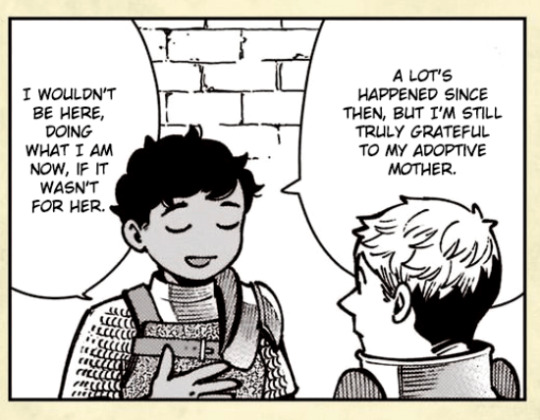
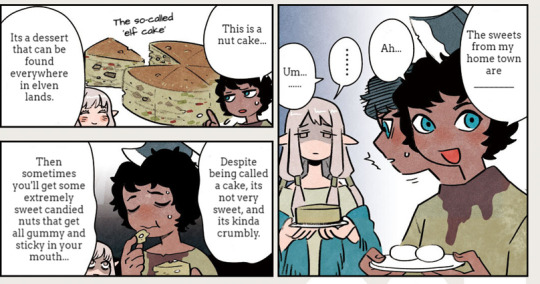
But even if she'd been perfect, living as an trans-racial adoptee in a deeply hierarchical nation with a queen who is a 'staunch traditionalist' who wouldn't even acknowledge the existence of a half-elf like Marcille (according to Cithis) is an experience that would deeply impact anyone.
Elves & Impossible mutual understanding
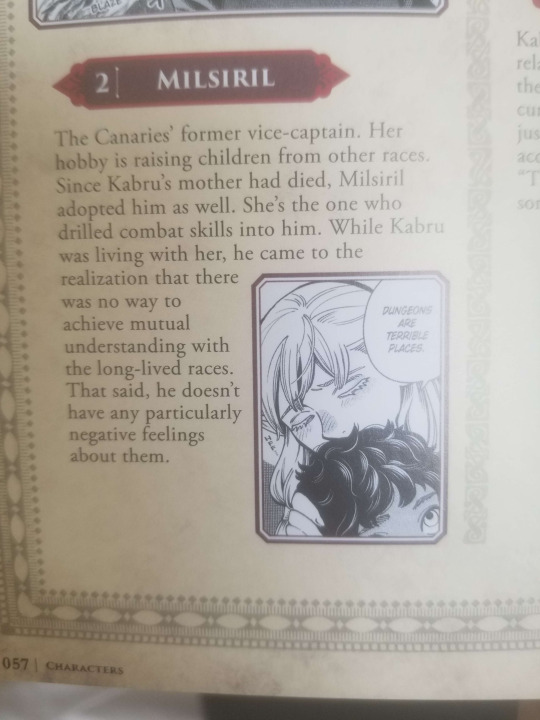
While Kabru was living with Milsiril - in other words, while living in the Northern Central Continent - he came to believe that "there was no way to achieve mutual understanding with the long-lived races."
This is evident in his political project: he wants short-lived races to have ownership over the dungeon's secrets. Despite his dislike of the Lord of the Island, he's a useful bulwark to stop the elves taking over. Despite his doubts about Laios, Laios needs to be the one to defeat the dungeon, because if he doesn't the elves will take over.
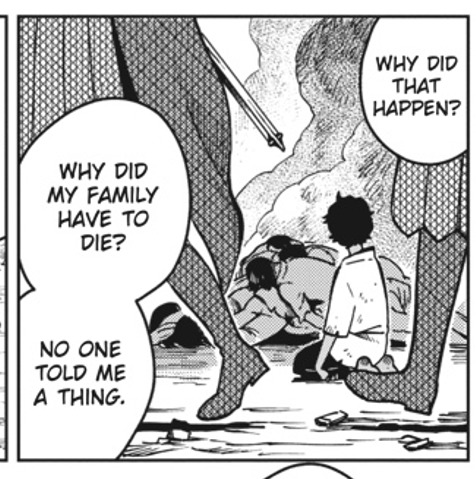
Kabru still carries a deep scar from Utaya, one that was exacerbated by the fact that he never got an answer to any of his questions about what happened or why. This, despite the fact that Milsiril knows about the demon and how it works. Do you think Kabru, with his social perceptiveness that borders on the superhuman, wasn't aware that she knew more than she would tell him?
Given that, the fact that he gets to a place where he "doesn't have any particularly negative feelings about [elves/long-lived species]" .... well, to put it bluntly, I believe that he thinks that's the case, but I kind of doubt it. After all, if he did have resentment, of Milsiril (someone who was his primary provider and caretaker since age six, and who despite her flaws, loves him and who I do think he loves) or of elves (who he has had to play nice with for most of his life, in order to survive, and will still have to play nice with in order to achieve his goals, since they hold all the power) what would that do except hurt him and make his life harder? Kabru is Mr. Pragmatic, so I don't think he'd let himself acknowledge any such feelings he did have. Exactly because he can't acknowledge them, they're well placed to get internalised as beliefs about the Fundamental Unchangeable Nature of the World.
However, these stated beliefs seem to contradict his actions. Despite his belief in the impossibility of forming a mutual understanding, he certainly seems to try to understand long-lived people, just as much as he does short-lived people. There's no noticeable difference between his treatment of Daya & Holm versus Mickbell & Rin that isn't clearly down to their relationship with him. His skills of human analysis were honed and developed while living amongst elves, and as soon as he's alone with Mithrun he immediately sets to understanding him - his interests, his motivations, his needs, and his past.
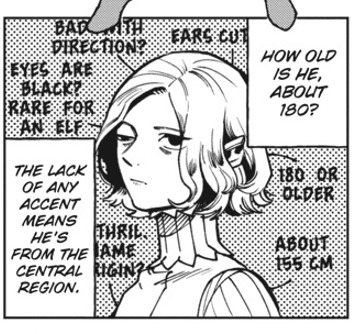
He treats him considerately and without bias, and despite the fact that Mithrun conquering the dungeon for the elves is both a reenactment of a core part of his childhood trauma and a political disaster for his aims, that doesn't seem to colour his perspective on Mithrun negatively at all.
This is something I find extremely laudable about Kabru, and it's another way he parallels Laios. He seems to understand that people, as a rule, (in Laios' case, he understands this about monsters - and eventually, all living beings) will act in their own interests, and if those interests conflict with yours, might harm you. But that's just their nature, and it's not something that should be held against them; you're also doing the same thing, after all. The crux of Laios' arc is precisely that he has to accept the responsibility of hurting someone else in order to achieve what he wants.
Kabru is deeply concerned with his own morals, what he should and shouldn't do, but mostly in the context of responsibility for the consequences - a responsibility he takes onto himself. He isn't scrupulous about what he needs to do in order to create the outcome he wants, but if he fails to create that outcome, then....
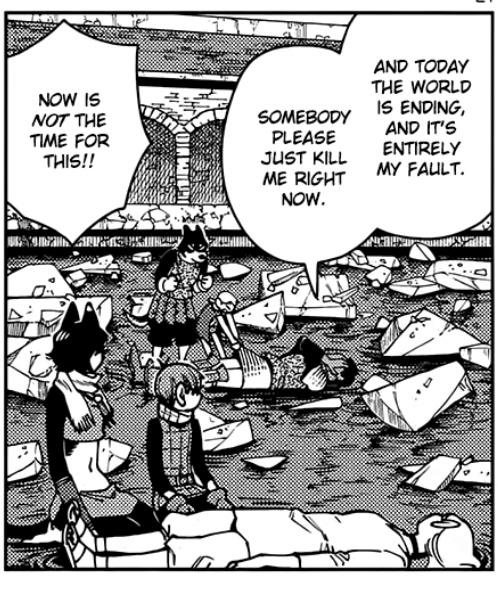
He blames himself to the point of thinking he should die. He doesn't blame Laios, or seem at all angry with him, despite concluding he should have killed him to prevent this outcome. That's because in his eyes, ultimately Laios was going to act according to his own nature, and it's Kabru's fault for not understanding that nature well enough. He's extremely confident in his ability to understand and predict others, (including elves and other long-lived people). Then, where does his conviction that mutual understanding is impossible come from?
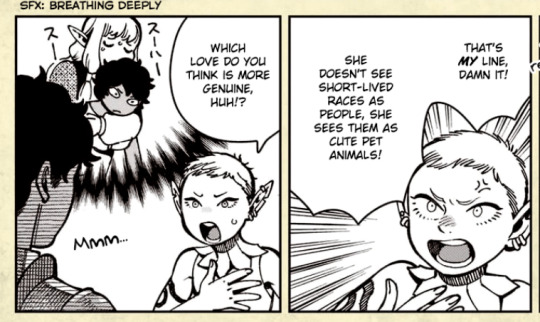
Partially, it's the "mutual" part. I'm sure Kabru, who isn't able or willing to deny Otta's insinuation that Milsiril saw him more like a pet than a son, has felt that his full interiority, the depth of his feelings and his ability to grow, act, and think as a fully equal being, was something that the elves around him just couldn't grasp. Because that was their excuse for it, he came to understand this as a gulf between short-lived and long-lived beings, an inevitable difference in outlook caused by their different lifespans.
This experience might be part of what leads to his iconic “fake” behaviour. He trusts his ability to understand others, but if they aren’t able to understand him, then there isn’t any benefit to being honest about his feelings and thoughts. If his attempts to reach mutual understanding with his caretakers were never able to be fulfilled, then it isn’t any wonder that he reacts with such surprise and horror at blurting out his desire to be Laios’ friend.
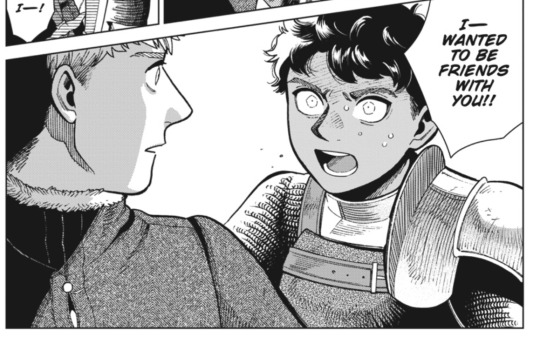
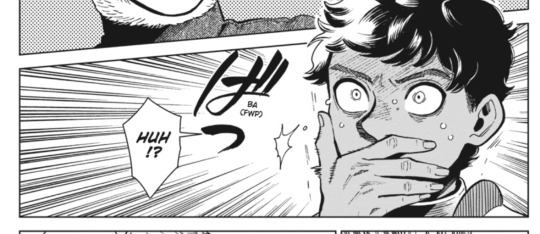
In his experience, making yourself vulnerable in that way only leads to being hurt. Soothing him, hushing him, lying to him, talking to him like a child that isn’t able to use proper judgement – that’s an inadequate and deeply hurtful way to respond to genuine distress, the desire for autonomy, or disagreement. Ultimately, I think that’s why he comes out on the side of being grateful to Milsiril; because she did equip him with the skills and knowledge he’d need to reach his goal, and let him go.
Though he could understand them, they couldn't understand him. To the extent that was true - which I'm sure it was - it wasn't due to anything about lifespan. It was due to the elves’ racism, and the solipsitic mindset & prejudiced attitude that it caused them to approach him with.
Because, if it needs to be said, the idea that there is an unbreachable gap in understanding between the long-lived and short-lived species is not true. Marcille and Laios have a much greater difference in lifespan than any full elf from any short-lived person, and they’re able to understand each other – maybe not perfectly, but better than many other people who are closer in life-span to them.
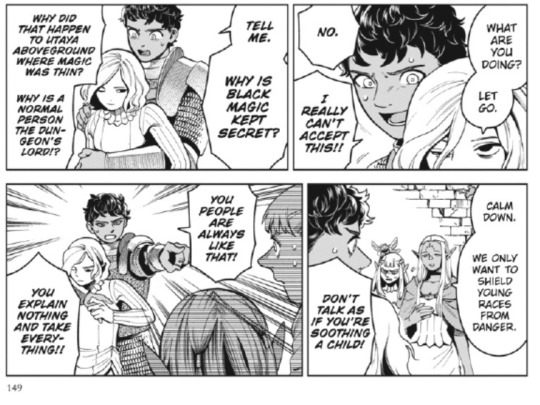
That doesn’t mean that I think Kabru is wrong about this, however. Because there’s an interpretation of his statement that is reflected in his actions and is true. When he talks about his problem with elves, it’s not just their attitudes: it’s their power, and what they use it to do. They “explain nothing and take everything”. Though it’s presented in the guise of ‘guiding and protecting’, in fact it’s a simple case of a powerful nation using their military power, wealth, access to resources, and historically stolen land – including the island itself – to protect their own interests and advance their own agenda. That’s why they’d be able to show up, seize the dungeon, and forcibly take Kabru’s party and Laios’ party to the West. If Kabru wants to stop that from happening, or change that status quo, persuasion or a bid to be understood would be completely pointless. Between the political blocs formed by long-lived species and the interests of short-lived species, “mutual understanding”, given their current, unequal terms, would be impossible. This is something that we see reflected in Kabru’s actions; before he asks his questions about the dungeon, he grabs Mithrun as leverage. He never really attempts to persuade the canaries to see his point of view, because that would be pointless: they’re agents of the Northern Central Continent’s monarchy, and will act in its interests regardless of any individual relationship with him.
I don’t think Kabru sees the different dimensions of this belief of his in quite such clear terms, however, as is evidenced by the other group who he thinks it’s impossible to communicate with.
Demi-Humans & Unknowable Objects
The other place that we see his conviction about the impossibility of mutual understanding is in the kobold extra.
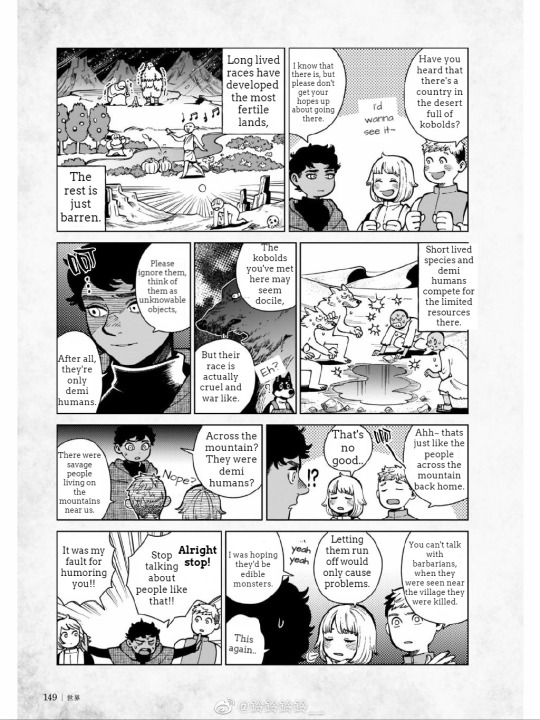
I'm including the whole thing, because I think it's an excellent and clever piece of world-building. Aside from what it says about Kabru, which I'll expand on shortly, what this extra does is deconstruct and call into question the usual "fantasy ontological biology" present in these sort of DnD-like settings. Essentially, the kind of worldbuilding where a race (such as kobolds) can be described as war-like, and that's establishing something essential about their biological nature. That's common to the point that if Kui didn't include this, some people would probably come away thinking that's the case about, e.g., the orcs.
But here, despite what Kabru is saying, the information the reader actually gets is:
the conflict between short-lived humans and demi-humans such as kobolds is mostly over access to material resources that they need to survive.
These resources are scarce because powerful nations, such as the elves, have monopolised them.
Kabru, who has grown up in a place at the centre of these conflicts, ascribes essential, negative traits to a cultural group which was in direct conflict with his own. Communication with this other group is impossible; they aren't people, they're more like objects.
oh yes! just like this conflict between groups of tall-men, a conflict which the reader will immediately interpret as more clearly analogous to real-life racism. Our other protagonists also carry prejudices from growing up in a place where a marginalised group was in conflict with the dominant group over scarce resources. It's definitely impossible to communicate with these people, and you can only kill them.
Woah, when you say it like that, it sounds pretty bad!
But also, nobody walks away having had a realisation or unlearned their prejudices - because they don't have the tools they need to do that work. Yet. I do think, to an extent, it could happen - especially with Kabru, since it's suggested in the epilogue that Melini might become a safe-haven for demi-humans.

To focus in on Kabru, the key here is his statement that you should think of demi-humans as "unknowable objects". Even his extraordinary powers of understanding have seemingly hit a limit. Part of this is just inherited prejudice, and doesn't need to have a complicated psychological explanation, any more than the elves who were prejudiced against him need one.
But also... this is probably somewhat linked to the way demi-humans seem to be considered "pseudo-monsters". They're the place that the strict delineation between the human and the monstrous is permeated. Laios, who is not interested in humans, remembers and is excited by Kuro. Chilchuck and Laios argue over whether it's OK to eat a mermaid. Kabru's prepared to (pretend to) roll with the idea that Laios ate the orcs.
But these are people, aren't they? Of course, this is a social construction, as we see from the fact that in the Eastern Archipelago, the label of "human" is reserved for tallmen, but in most of the rest of the world it depends on some obviously arbirary classification based on number of bones; "demi-humans" aren't in any essential way monstrous, except to an extent in their appearance, and physical location - due to their marginal social status, they're pushed out to live in unsafe places such as dungeons.
Therefore, Kabru's view of demi-humans as fundamentally "other", unable to be understood - monstrous - could be read as akin to abjection, the psychoanalytical concept described by Julia Kristeva. In order to create a bounded, secure superego, that thing which permeates and calls into question the border between self and other, human and animal, life and death, is rejected and pushed to the margin.
“Not me. Not that. But not nothing, either. A "something" that I do not recognize as a thing.[...] On the edge of nonexistence and hallucination, of a reality that, if I acknowledge it, annihilates me. There, abject and abjection are my safeguards. The primers of my culture.” (Kristeva et al., 1984, p. 11)
“It is thus not lack of cleanliness or health that causes abjection but what disturbs identity, system, order. ” (Kristeva et al., 1984, p. 13)
“The pure will be that which conforms to an established taxonomy; the impure, that which unsettles it, establishes intermixture and disorder. [...] the impure will be those that do not confine themselves to one element but point to admixture and confusion.” (Kristeva et al., 1984, p. 107) (discussing food prohibitions in Leviticus)
This is both (due to its affinity with food-loathing and disgust) a very fruitful concept to apply to dunmeshi, and a psychoanalytical theory which I wouldn't exactly cosign as True Facts About Human Psychological Development. You may also know the abject from its utilisation in the classic essay "Horror and the Monstrous-Feminine" by Barbara Creed - that's a lot more approachable than Kristeva if anyone's interested.
Key here, though, is that through the symbol of the "demi-human" is embodied a step between "human" and "monster" - and that's a prospect that puts at risk the whole notion of an absolute separation between those two categories in the first place. To Laios, that's something wonderful, and to Kabru, it's terrifying. We can see this principle further embodied in the relationship both characters have with the notion of becoming monstrous.
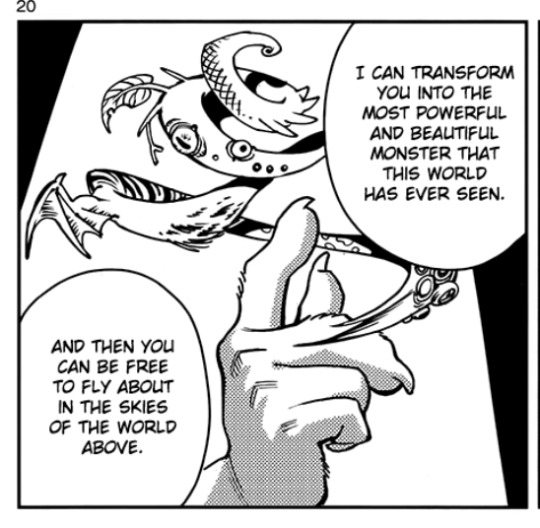
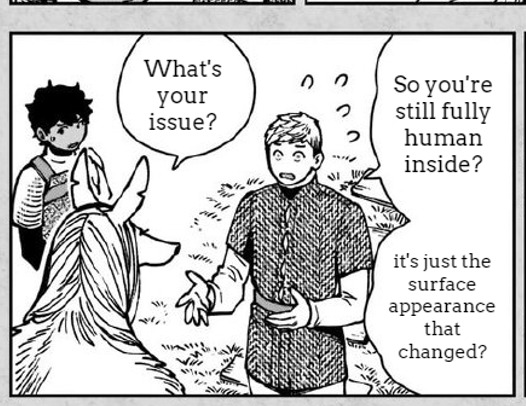
To Laios, this is transcendent, and represents a renunciation of everything human - in fact, if it didn't, it wouldn't "count".
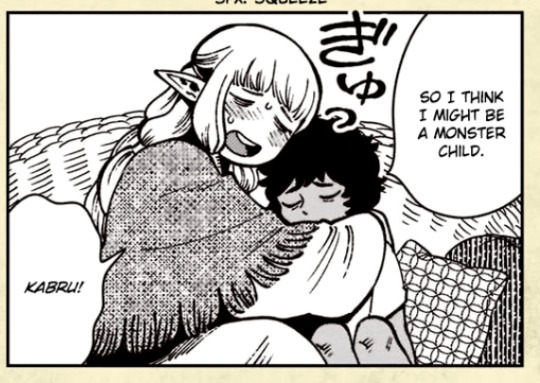
To Kabru, it's a deeply-held fear, established by his childhood alienation (due to his illegitimacy, his eyes, and perhaps also his neurodivergency), deepened by monster-related trauma and the sense of responsibility and survivors guilt he feels for what happened at Utaya. His identity as a human who is not monstrous is key to his sense of stability and safety; he doesn't want to touch monsters, he doesn't even want to see them.
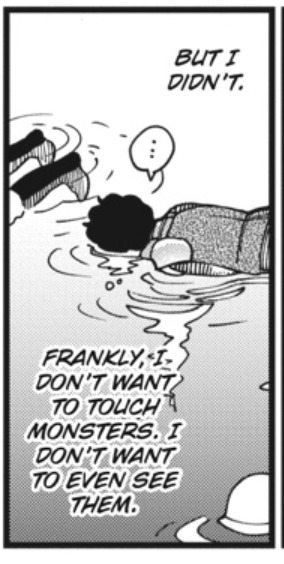
To acknowledge a kinship, a possibility of similarity between the things he loves (humans) and the things he hates (monsters) would be more than touching them - it would be putting them inside him. We know, quite explicitly, that this notion is triggering to Kabru. He literally has what seems to be a flashback when he's about to eat the harpy omelette.
So he abjects it, classifying the demi-human as fundamentally unlike him - an unknowable object, or an object that he refuses to know. Because in understanding it, he would interject the things he hates and fears into his self, which is already, always under threat by that hated and feared object.
Of course, again, Kabru isn't very good at enacting this refusal in practice. For one, when he chooses between his desires and ingesting the feared object, eating monsters... he eats monsters. Part of this is treating himself badly, the "ends justify the means" mentality. His goal is to destroy all monsters, so if he needs to become monster-like to do that, he will. But part of it is also the other motivation that he didn't even seem to know about until he said it: he wants to become Laios' friend, and to learn from him how a person can like monsters. He wants, at least in some part of him, to reconcile the feared and hated object into something he can understand.
For another:
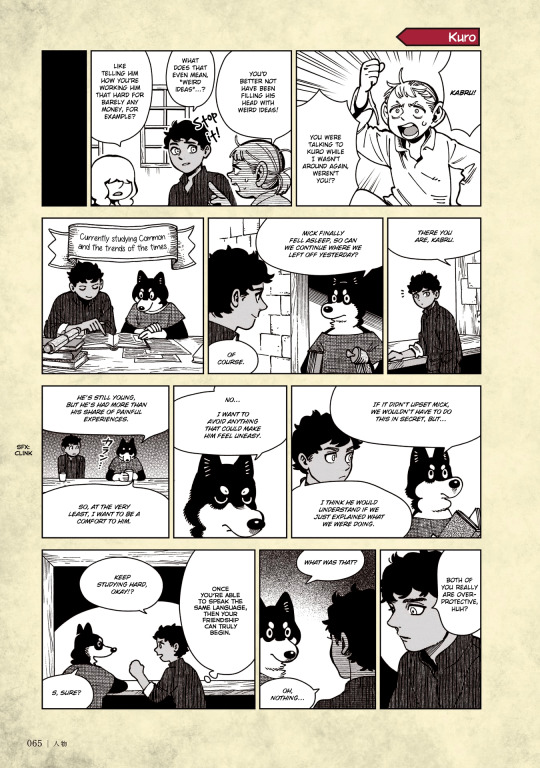
Kabru can speak the kobold language. In the first place, while this may have been common in Utaya, it also could have been something he chose to learn, an early expression of his interest in understanding and talking to all sorts of people. It isn't the kind of thing you learn if you believe that communication between yourself and the group that speak it is impossible, is it?
It's possible to harbour prejudices against a group while being kind to an individual, and given Kabru has those prejudices regardless of his reasons, that is what he is doing. But also, his treatment of Kuro doesn't reflect a sincerely held belief that he's an "unknowable object" at all. His approach is exactly the same as it is to any other person: an analysis of goal and motive, and an attempt to help if he's sympathetic and their goals align - going out of his way to give language and local knowledge lessons in secret. His conviction that Mickbell and Kuro will truly become friends when they can properly communicate is completely contradictory to any sense of demi-humans as fundamentally different, or impossible to reach mutual understanding with. To me, it seems like this self-protective shield against the corruptive force demi-humans as an idea present to his identity, this abjection, when Kabru is face-to-face with one, just simply can't hold up against his finely honed skill of intellectual empathy. Perhaps because he's autistic, it seems his "empathy" is less an emotional mirror response, and more a set of cognitive skills for analysis of others. That instinctual, emotional empathy might not trigger when presented with a member of an out-group, but if it’s possible for Kabru to turn his cognitive empathy off, we don’t see him do it.
This isn't to say that this prejudice doesn't affect his behaviour. For one, it could negatively impact his judgement of politics and policy, where individual people don't enter into it. For another, I'm not convinced he'd be willing to overlook Mickbell's exploitative relationship with Kuro if Kuro wasn't a kobold. As it is, since both of them are satisfied, he doesn't feel like he needs to intervene, regardless of the fact Mickbell isn't paying Kuro. But if Daya and Holm were in a relationship, and Holm took both Daya's and his own share from their ventures, but only compensated her in living expenses and kept the rest, do you think he'd tolerate it, for example? Even if she said it was OK?
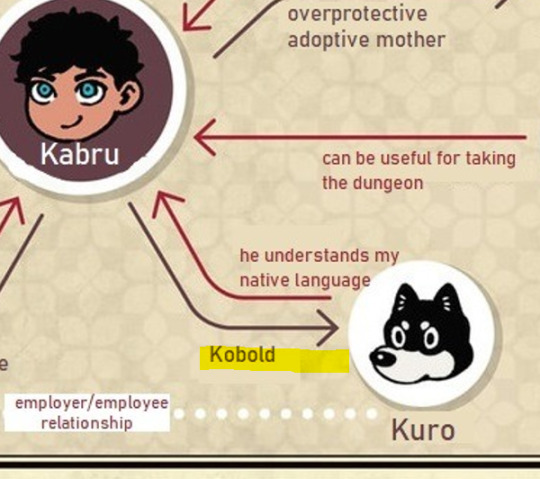
Conclusion

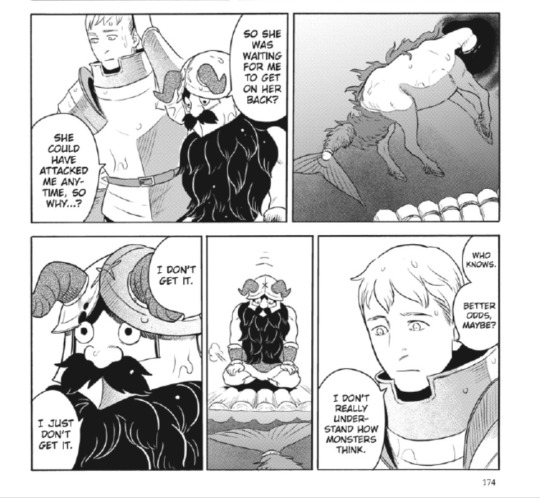
The kelpie chapter establishes that "people can never know what monsters are really thinking." That isn't just true of monsters, though.
True mutual understanding is impossible - between anyone. We can never truly understand another person's heart. This is touched on in, for example, the existence of shapeshifters and dopplegangers. Even a monster that seemed like a perfect copy of a person wouldn’t be that person, and wouldn’t be a satisfactory replacement.
We’re intended, I think, to understand the winged lion's repeated suggestions to just replace people who have been lost with copies as something uncanny, which demonstrates the way that the winged lion never manages to attain a complete understanding of humans. A version of a person who was created to fulfil your memories of them, to be the person who you wanted them to be, would be a terrible, miserable thing.
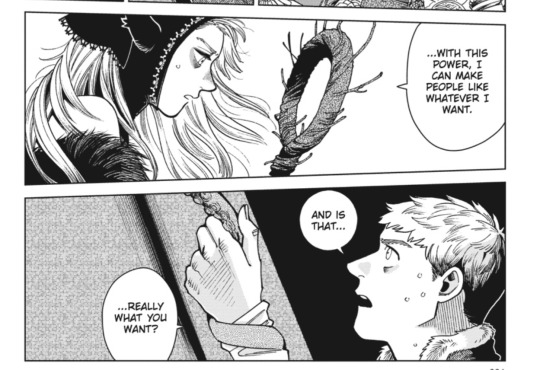
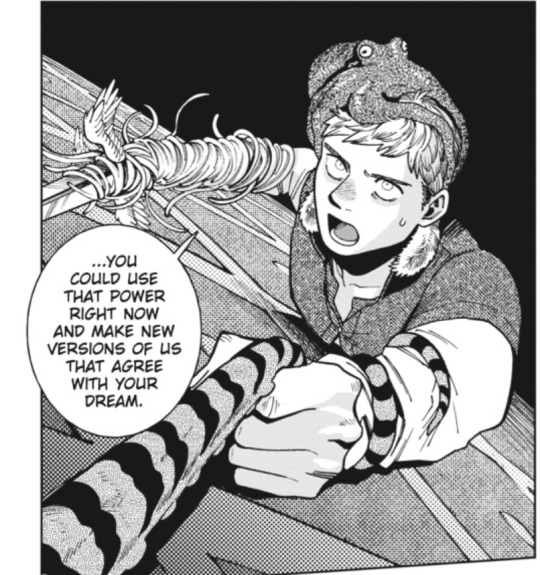

Disagreeing, coming into conflict, and misunderstanding each other, are essential parts of what it means to be living beings, as fundamental as the need to eat.
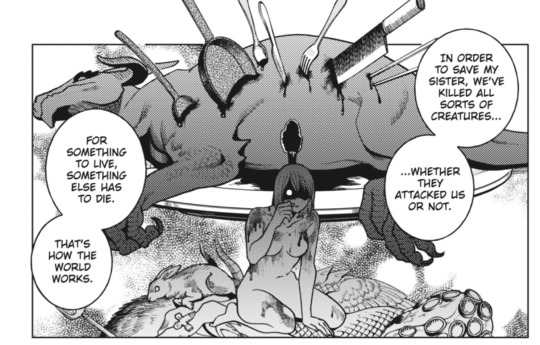
The only thing to do is not to take more than you need to eat to survive, and not impose your own desires onto others. To do your best to sincerely communicate your desires, even if they're embarrassing or vulnerable or strange, like Kabru eventually does with Laios; like Laios does, bit by bit, with the people around him; like Marcille does, Chilchuck does, Senshi does... to hope they will accept you, and do your best to understand them in return.
We can re-examine, in that context, Kabru's line about the elves' tendency to "explain nothing and take everything".
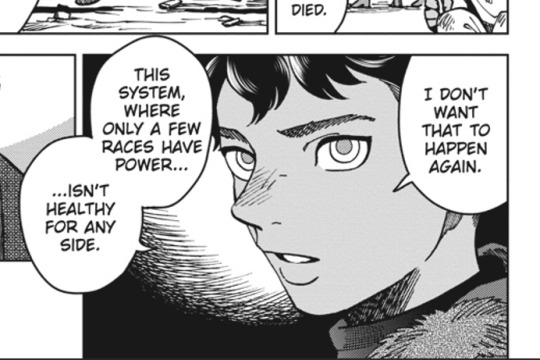
They have the power to impose their preferred "menu" onto less powerful groups. And in that context, mutual understanding being impossible just means that they won't give up their power because they're asked nicely. Kabru's goal is to seize the truth that they won't give to him, and to create a situation where they can't take everything. Because he's accurately surmised that nothing about the treatment of short-lived races will change so long as the power imbalance remains. Despite the way he mistakenly ascribes part of that to "long-lived vs short-lived" or "human vs demi-human", the actual gulfs in understanding he identifies are structural, are about power and about access to material resources and safety.
I think he could come to recognise this. Yaad is teaching him political science after all, and while a prince's lessons on political science won't exactly get at much that's radical or invested in the interests and perspectives of the marginalised (Capital is a critique of for a reason after all...) I believe in Kabru's ability to learn critically and get more from a lesson than it was intended to teach.
#reblog#v v good post#it’s awesome to see how many pieces of both character & larger political worldbuilding analysis you pull into this#and in general highlighting the idea of mutual understanding and how it permeates so much of dunmeshi…. there is no perfect answer but#you must continue to try. you must. augh.#I love Kabru meta so much it’s good. he’s such a rich character#also:#‘He trusts his ability to understand others#others but if they aren’t able to understand him#then there isn’t any benefit to being honest about his feelings and thoughts’#truly the idea of Kabru being hit with a desire to be understood in post canon just takes me out#give that boy a Hunger to be Seen!!! he’s been repressing it too long I need it to ruin his life a little bit!!!
316 notes
·
View notes
Text
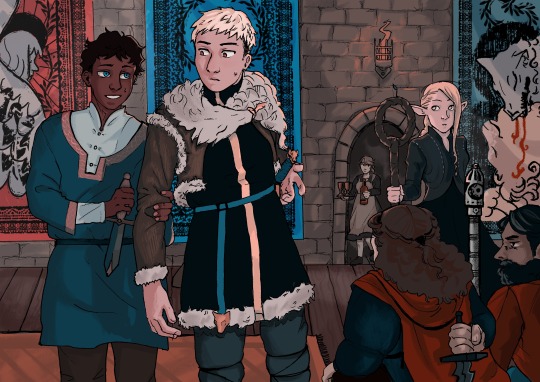
Ambush
#reblog#im drafting this so I can post it after like. the fuckin appropriate time for my fic#not that it’s directly related or inspired in either direction I just want to be able to look at it once chapter 2 goes up 🥰#OKAY I CAN REBLOG IT NOW YAAAAAY YAY YIPPEE#anyway gosh I love this art all the details are so good#the expressions. Marcille. the banners in the background#I like how the blue one is framing Laios like yeah he is a little bit holy now huh. but also he's a person and he's unsure and they are all#figuring stuff out. idk#it just captures a great mood. As much as the threat is there it's not like scary its part of the tapestry. the new way their lives work#also idk if this is intentional but the serving woman in the background really invokes the living paintings for me#which is fitting considering. you know#augh anyway yeah good stuff. love the colors also
579 notes
·
View notes
Text
writing dunmeshi fic is fun bc like literally every character has at least one topic that will send them into a complete and utter emotional freefall
#I don't think anything I write could ever be called remotely near what I would define as 'whump'#but boy do I love to give these guys panic attacks
24 notes
·
View notes
Text
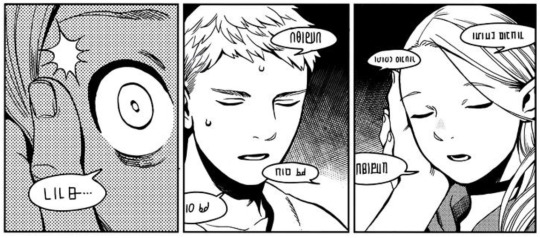
You can tell that Laios has an accent. His letters are more squishy and soft and Marcille's are more angular. He pronounces a ㅁ like it's an ㅇ.
#reblog#ougghhhh this is SO cool#he really is a crazy fast learner huh#wonder how much of it is him having more of knack for it than he realize vs Marcille being a really good teacher#vs desperate times call for learn fast or die#probably all three
16K notes
·
View notes
Text
The day is saved. The demon is defeated, the kingdom is returned, and a new king is crowned. It’s the perfect ending to a tale of heroes and adventure… But Laios and his friends have never fit particularly well into storybook molds.
Left with a hundred questions about the future still to answer, and amidst growing concerns regarding the forces that would be all too happy to take that future away, they make their way as they always have: by holding fast to each other and figuring the rest out as they go.
Chapter 2 is up! Falin is in it!
19 notes
·
View notes
Text

Girl who wants her friends to live long and healthy vs guy who sucks at taking care of himself who wins
#reblog#OUGHHHHHH GH HH THE GOOFERS…. THE SAD GOOFERS#ilu golden country trio#this is so so charming
11K notes
·
View notes
Text
World Map Notes: the Elven Northern & Southern Central Continents
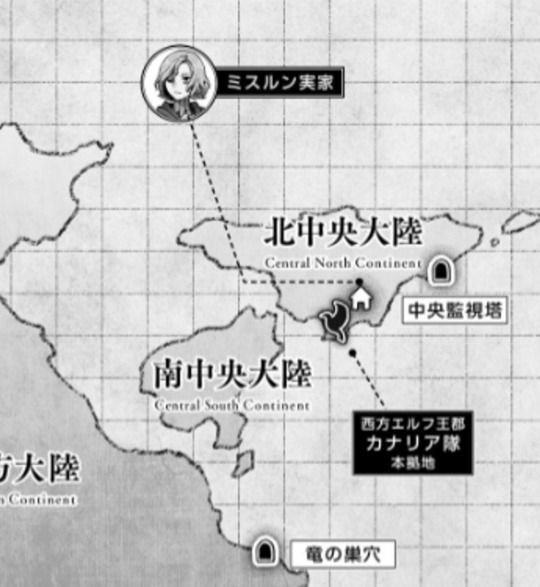
These nations are where all the elves in the story except Marcille and Thistle are from. This post collects all the information I could find about these two nations, and included a bit of analysis based on that information.
TL;DR (includes both fact and my speculation):
The Northern Central Continent is a feudal monarchy with a strong class system, as well as strict borders, & could probably be considered an ethnostate. It's deeply hierarchical, and the queen is a traditionalist - so it's probably very structurally biased against non-elves and half-elves.
Elves in the NCC practice cannibalism in some rural areas!
The Southern Central Continent is more diverse, with a large tallman population on its South Coast.
To elves, "Court Magicians" exclusively refer to those serving the elven queen - a prestigious role that seems likely to be only open to nobles.
The SCC may not be a monarchy, though it's not clear what kind of leadership or societal structure it does have.
The NCC will habitually take anyone involved in ancient magic as a criminal to prosecute on their terms, regardless of jurisdiction, but this depends on their political influence and ability to pressure local leaders to agree to extradite the criminal.
Elves VS Dwarves and Gnomes may have been at war around the time of the Golden Kingdom being sealed. This conflict also may be one of the factors pushing the kingdom to be sealed in the first place.
The "Central Region" might be the origin of the "Common Tongue" that our characters speak.
Northern Central Continent
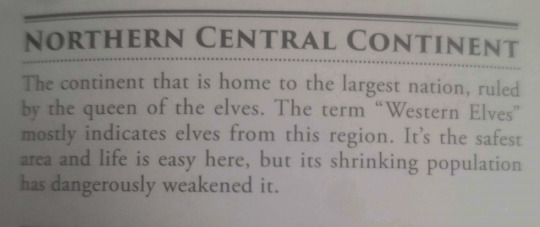
The Adventurer's Bible | p. 132
For this place to have a high quality of life, and also a declining population - especially when it's so close to the Western Continent, which is stated to have poor quality of life - there must be strictly maintained borders and a strong anti-immigration policy. Based on the attitude of the elves, I wouldn't be surprised if it was very difficult to move there unless you are also an elf.
It could probably be considered an ethnostate - and while in these kinds of fantasy worlds, that's pretty common. Take Rivendell, or Moria, in LOTR - they take for granted that these kinds of different fantasy races will live in separate communities.
But that isn't actually realistic, and I think Kui has considered it as more of a politically established status quo rather than an obvious natural result of having magically distinct "races". Which, even in Dunmeshi, I think is a difficult and not-terribly-accurate way to represent politics - racism does not emerge from actual, physical differences between races, after all.
But Dunmeshi's presentation of this idea is interesting, because of the recognition that if there is an "elven nation" which prioritises the interests and rights of elves over other races, that is because there's a deliberate, concerted effort to keep it that way.
But there's a small section of the NCC with a high tallman population - I wonder what kind of community they have, and how they fit into the strict elven hierarchy?
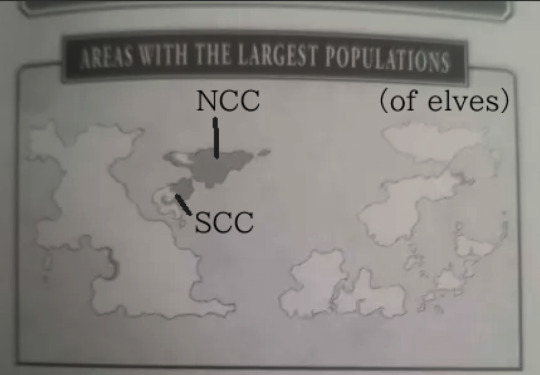

The Adventurer's Bible | pp. 134 & 136
Kabru and Rin, and other kids like them, who are adopted or taken as adopted children(rarely - the way Milsiril treats Kabru is not perfect, but she's deliberately attempting to be better than other elves.... meaning other elves are usually worse)/pets/objects by elven nobles, as well as accomplished or notable individuals who earn the elves' favour/are "invited" to stay (such as they try with Laios at the end of the story) would be an exception.
Other long-lived races could probably (...?) visit, but given the historical conflict between elves, dwarves, and gnomes, I think they'd also be pretty hostile to many of them coming to live on the NCC, even if they see them as more like equals.
Social Structure & Nobility
The Northern Central Continent is an absolute monarchy under a 372 year old queen, Heimeya (IDK what the official romanisation of her name will be).
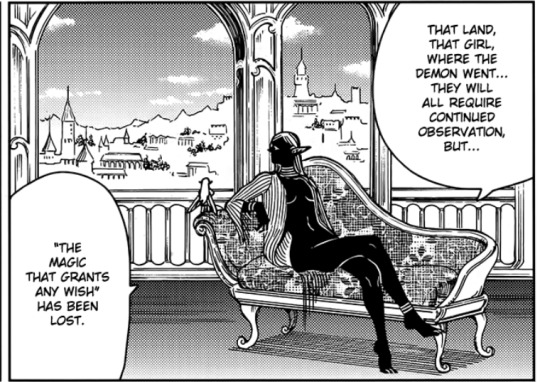
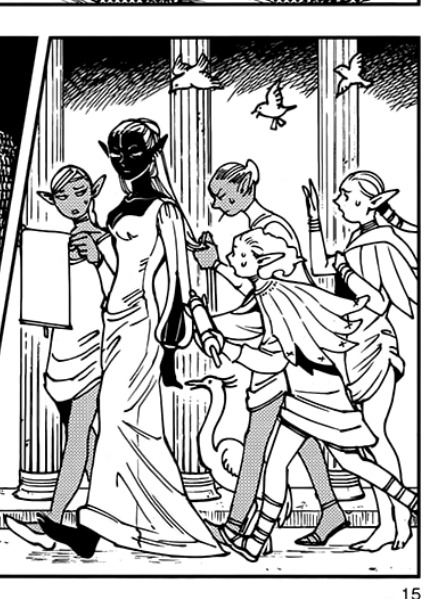
...With extended "nobility", which are the group that the canaries' guards draw from. We don't get much clarification of what sort of structure their nobility has, what titles there are, and where our characters who are nobles fall into it.
Pattadol (House of Vari), Mithrun (House of Kerensil), and Milsiril (House of Tol) are nobles.
Mithrun's noble house, Kerensil, is apparently a well-known family of investors! I wonder what sorts of businesses they invest in & what the elven economy is like?
Milsiril's house, on the other hand, is a well-known military family. I wonder if Kabru could claim the surname "of the House of Tol". He did go to family gatherings after all. But if he was comfortable doing so and it would be accepted, I would assume he'd have done so when introducing himself to the canaries.
Flamela is a distant relative of the queen, who has additional status due to exhibiting the genetic trait associated with their queens, extremely dark skin.
The queen is a "staunch traditionalist" who wouldn't even acknowledge a half-elf like Marcille. Nice! I really feel bad for Kabru and Rin growing up as tallmen in this sort of culture.
Court Magicians
While generally this is a term for any magic user who serves in a royal court, in the Northern Central Continent it seems to carry a lot of esteem; even just as the daughter of one, Pattadol assumes Marcille has the right to boss her around and to handle highly secret, highly illegal ancient magic secrets.
That makes sense, as in the society of the Northern Central Continent, you'd be directly serving the elven queen. But also, she has enough Court Magicians that Pattadol would not expect to know Marcille's mother's name, but few enough that it would be a big deal and Cithis would know about it if one had a half-elf child.
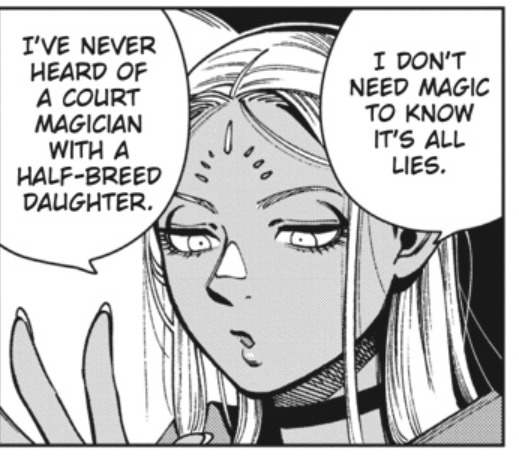
I don't think it's remotely unlikely based on that to assume that this role is only available to nobles.
A "Court Magician" who doesn't serve the NCC Queen isn't a "real" Court Magician in the eyes of NCC elves. Those short-lived monarchs would be happy just to have an elf around regardless of whether they were actually any good at magic.... according to Cithis.
Magic seems very important to the society of the NCC elves. The queen communicates with her subordinates via familar, and the birds we see surrounding her seem like they are some kind of magic - perhaps not familiars since we see her familiar, but some other kind of scrying?
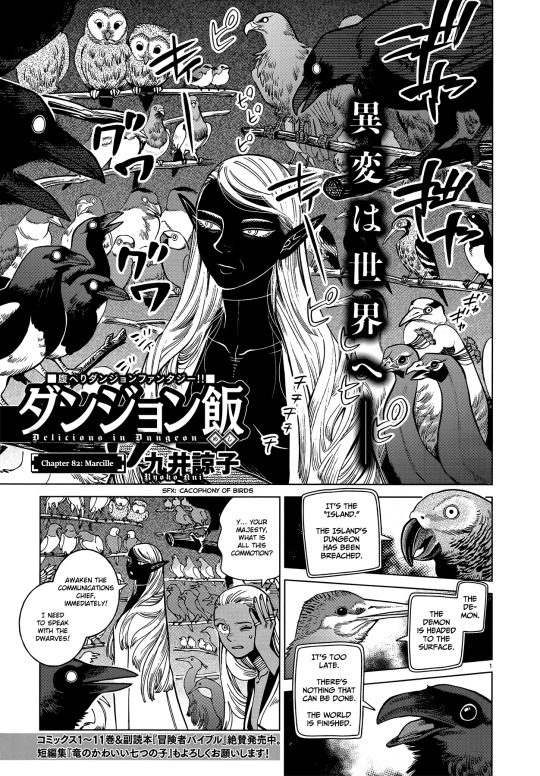
Also, based on the fact Pattadol assumes a Court Magician would be serving the Queen of the NCC, we can theorise that perhaps whatever structure the SCC has, it isn't a monarchy....? Heimeya is "the queen of the elves", after all - that doesn't sound like there's another elven monarch competing for the title just next door.
Ordinary People
Apparently the NCC is a safe place and life is easy -- but given the strict class system, I kind of expect that varies a lot depending on the family you're born into.
The only elves we meet who are not nobles are the convicted criminal canaries, so it's hard to get a sense of what life is like for them from that. Cithis was apparently a wealthy fortune teller with "an intense jealousy for those born noble or wealthy." So I assume she was not born into comfort.
Apparently "There are also primitive villages deep in the woods and underground, and in some regions cannibalism is still practiced." Which is awesome. Based on her videogame elves art I think Kui's probably making a little nod to Divinity: Original Sin elves, who can absorb memories through eating the flesh of others. Elves in dungeon meshi don't have this trait, but I wonder if there is a magical ritual or some kind of cultural practice with a similar intention.
Cuisine
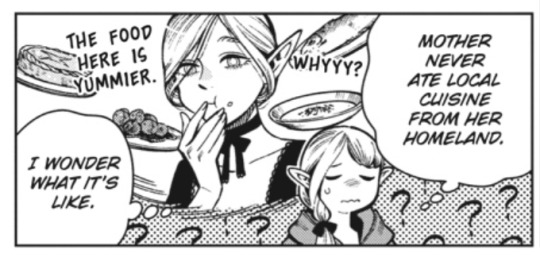
Marcille's mother didn't think much of the elven cuisine.
Liricmumwarel is fancy candy given out by the elven queen the shape of which conveys blessings.
Elf Cake is a crumbly dry cake that Kabru and Thistle don't think much of. I've heard someone discuss what it's likely to be made of, but I am afraid I don't recall.
Southern Central Continent
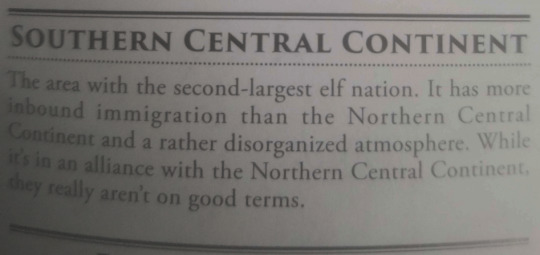
The Adventurer's Bible | p. 132
It seems like the Southern Central Continent gets a lot more immigration and has a more diverse population, especially along the south coast (near the Western Continent). That south coast has a high tallman population.
Fleki and Lycion are from the Southern Central Continent. Fleki got into ancient magic for the money, so you can assume there's probably class disparity there too; things are noted by Kui to be more "disorganised" than the NCC. Not a bad thing at all - the NCC is definitely too "organised" in my books. But that does potentially also mean there's less, e.g., bureaucracy, central organisation, less of a social safety net. But then again, in the NCC I doubt that whatever "safety net" there is, is available to everyone.
We can't extrapolate much from Fleki & Lycion's personalities, because they clearly aren't in the most stable societal position, and I get the sense that they're the countercultural type - they probably don't represent the type of person typical to the SCC. Also, our NCC characters are all either nobles or used to navigating high society (Cithis, Kabru to an extent) so they aren't exactly a typical "ordinary NCC person" as a basis for comparison either. However, there's less of a "strict set of social rules" type of feel to the SCC characters, fitting with my suggestion that the SCC may not be a society with a strong feudal element.
Geopolitics & Conflict
The fact that, despite their being from the SCC, Fleki and Lycion are in the Canaries, who work directly under the NCC's Queen, implies that the the NCC feel entitled to process and prosecute people who commit ancient magic-related crimes regardless of any notion of "jurisdiction". This is backed up by the way that they were going to take Marcille - but that is something that the governor of the Island had to give permission for, which Laios is able to withdraw. So I assume that the NCC elves apply pressure on various world leaders to extradite criminals involved in ancient magic.
The SCC would cooperate with this, since they're allies, even if they don't have a great relationship (according to the World Guide).
The NCC are also clearly able to take half-foots without trouble, as we see by Chilchuck saying he's known half-foots who got involved with "black magic" (ancient magic) and were disappeared by the elves. But I doubt gnomes or dwarves are giving people up easily - though that probably doesn't go for dwarves like Senshi and Namari, without strong community ties.
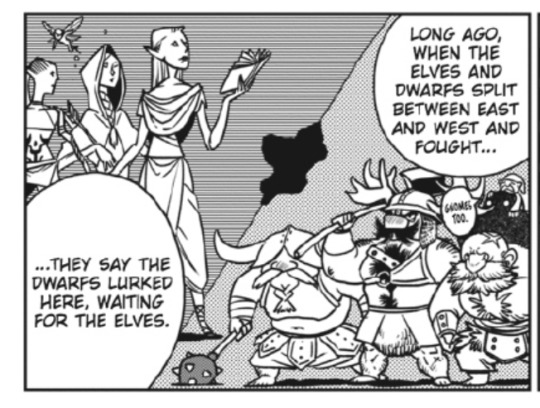
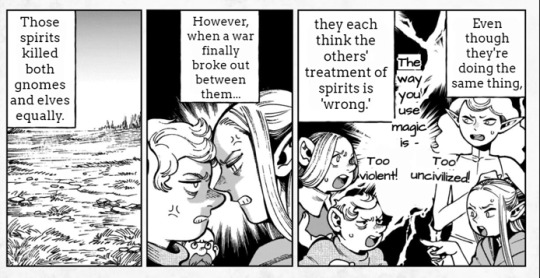
Long before the current times, elves fought dwarves & gnomes. There might have been more than one of these conflicts...? While long ago, this war isn't "ancient" (like the ancients who sealed the demon into dungeons, before their world was mostly destroyed by it).
Thistle, Delgal, and the Golden Kingdom were (I believe) caught up in one of these conflicts, which used Melini as a staging ground - thus why Thistle was pushed to seal the entire kingdom in the dungeon.
To do this, Thistle unseals a dungeon created by the "ancient people". These could be the "ancients" who created the dungeons, before the apocalypse. Or they could be another, still extinct, society.
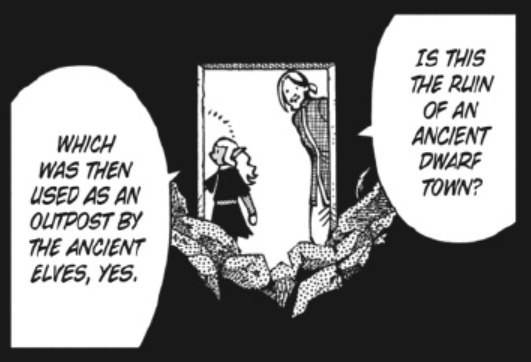
Regardless, at least one of these conflicts seems to have taken place after the golden kingdom was sealed - so, within the last 1000 years.
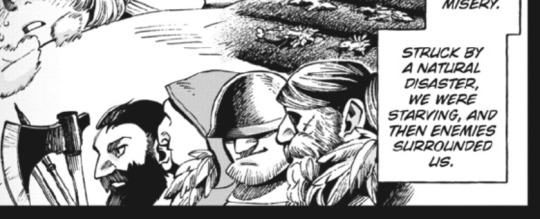
Though, this could refer to a different, more localised conflict between the Golden Kingdom and their dwarven neighbours.
The order of events is that the Golden Kingdom was sealed (1000 years ago or so) > Dwarves took over > Elves stole the land from the Dwarves ("long ago" by the Island Lord, a tallman's, standards) > Elves gave the land to a local lord, who was either an ancestor of the Island Lord, or the Island Lord himself. The Island Lord is himself a descendant of the lord who poisoned Delgal's father, as is noted in the World Guide. However, it isn't impossible for there to be large gaps of time between these events, which could put the elf / dwarf wars at a more recent date.
The fact we know that the elves stole the land from the dwarves, and then granted it to a political actor who was relevant during the events of the Golden Kingdom flashbacks we see suggests to me that the events were roughly contemporaneous. If they were, that puts at least one of these conflicts at roughly 1000 years ago.
So, the elf/dwarf & gnome conflict is "long ago" by short-lived standards, but would be considered "modern" by the long-lived races, if you ask me. At least, the equivalent of the World Wars for us - recent history, even if we weren't alive.
I'm guessing the "Elf King" from the below panel in fact was a word that's more gender-neutral in Japanese, since the "Western Elves" definitely have a queen.
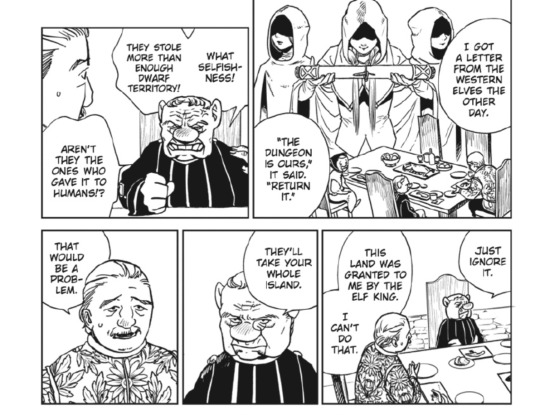
Language
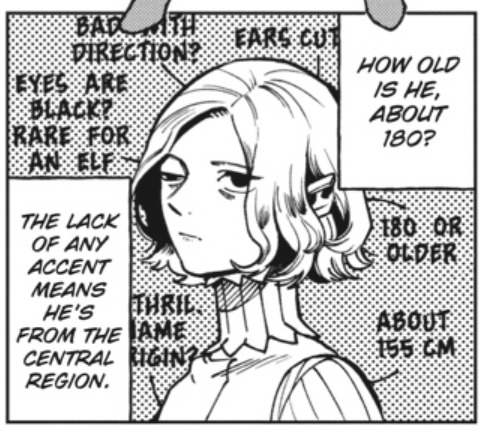
When Kabru says the "Central region" I expect he means the region where the NCC and SCC is.
The fact that he observes that the lack of any accent means he's from the Central Region is really interesting. It could mean two things;
either they switched to speaking in the language spoken on those continents, which Kabru would naturally know, having grown up there. It's 100 percent possible, but I think this would be noted in the story.
or, the language that gets called "the common tongue", the one that all our principle characters speak for most of the story, originated from the elves in the Central Continent. Or at least it's the same one that the elves use, and their political influence is great enough that their accent gets to be considered not an accent at all. The fact they were "granting" land in this area to tall-man lords suggests a large enough historical influence in the area that this is quite plausible to me.
Mithrun absolutely does have an accent - nobody speaks without an accent. His accent is just politically and socioculturally normalised to the point of being considered the "default/proper" way to speak - like received pronounciation in English.
The common tongue isn't ubiquitous everywhere - not just Kuro, but Kiki and Kaka are also noted to be studying the common tongue. The Tansus were born on the Eastern Continent, so probably gnome communities there speak their own language - Kiki and Kaka grew up primarily surrounded by gnomes after all.
It's also quite likely that Kabru, specifically, because of where he grew up, would consider Mithrun's way of talking to be the default "not an accent" accent. His adoptive mother surely has the same upper-class NCC accent. I expect that other characters might experience it as more "marked".
This isn't a world where everyone speaks the same language everywhere; the common tongue is called that, but there are many different languages. Kabru and Chilchuck are two characters who are adept with many of them - Kabru speaks the language of the kobold, and probably lots more. Chilchuck works as an interpreter as part of his union stuff - I can tell you from experience that that's a hugely valuable skillset in that context, as many of the people who most need union representation are people who don't speak the dominant language, or at least not fluently.
If you got all the way to the end of this post.... thank you for reading, I love you. Check out my other World Map Notes under that tag on my blog; I've made a few so far and there will almost certainly be more. Next I'm thinking the dwarven nations...? But I could be persuaded if someone had a preference.
Also, anyone got any speculation on what, exactly, is the previous time that Heimeya ate a person/monster/chimera that this panel implies:

We really don't have anything to go on whatsoever, but I think it's a fun tidbit.
#reblog#ELF POLITICS WAHOO#good read/highlighting on the like border politics in the NCC and SCC that’s v interesting#also THE ISLAND LORD IS DESCENDED FROM THE GUY WHO POISONED DELGAL’S DAD???? I missed/forgot that tidbit#truly the soap opera only available to those who do a close reading of the world guide is wild#anyway great ref thank you!
155 notes
·
View notes
Text

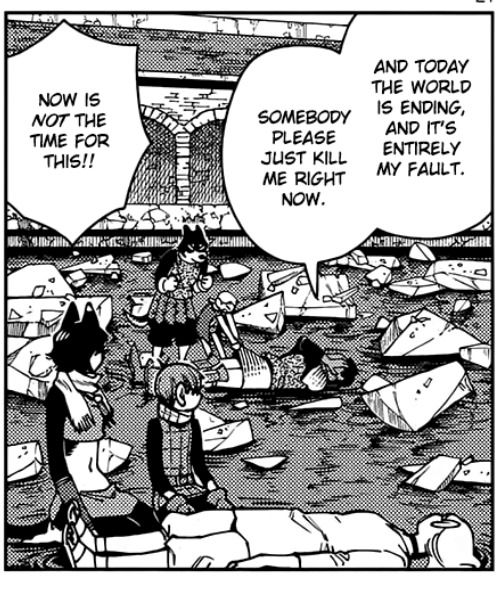
I think that it's an interesting character note that what Kabru blames himself for is where he restrained himself and didn't act.
He didn't kill Laios when he had the chance. Now, if the world had ended I do think he would bear some responsibility here... not to the extent he feels he does, which is driven to extremes by his survivor's guilt. It's certainly not "entirely his fault"! After all, if the world had ended, some of the blame should definitely go to Laios! And it's not really "blame", since the outcome is ultimately a great one - the demon is defeated! But, essentially, it is true that Kabru's presence in the story is instrumental in getting to the point we are at in chapter 90.
But what I'd pinpoint as the reason for that responsibility is not because he didn't kill Laios, but because he intervened to stop Mithrun killing Thistle and conquering the dungeon, and then intervened again to stop Laios from being captured by Lycion.
In this moment, these interventions don't even occur to Kabru. He's such an action-oriented character that he instinctively reaches for a place where he didn't act, rather than the places where he did. It's like he needs it to be the case that "I could have stopped this if I'd done more", rather than "I could have stopped this if I hadn't involved myself". I think that's really telling about the kind of person that he is. It also links compellingly to a self-soothing narrative, where "I can fix this and control the outcome if I work out the right set of actions to take," which is a result of the way he's processed the trauma of his childhood.
#reblog#yesssss yes#my take on this scene is focused more on him regretting stuff w Laios bc it was selfish and messy and vulnerable#he expressed a want for himself rather than for the Greater Good#BUT stopping Mithrun was also selfish. but it was a different kind of selfish#I reread that chapter the other day and it hit me hard in the face how much Kabru was straight up triggered into action#his thoughts going to ‘maybe this is impossible for a short-life species to handle’ right before he acts#but yeah back to your point: his action there very much gave him MORE control
243 notes
·
View notes
Text
The day is saved. The demon is defeated, the kingdom is returned, and a new king is crowned. It’s the perfect ending to a tale of heroes and adventure… But Laios and his friends have never fit particularly well into storybook molds.
Left with a hundred questions about the future still to answer, and amidst growing concerns regarding the forces that would be all too happy to take that future away, they make their way as they always have: by holding fast to each other and figuring the rest out as they go.
Chapter 2 is up! Falin is in it!
19 notes
·
View notes
Text
The next chapter of No Reason But to Starve goes up tomorrow btw 🥰
#it’s a fun one I’m very excited. chapter 1 was the foundation now I get to get cooking#nrbts#<- making that a tag I think. in case I want it later#anyway hopefully it should be going up in the morning#so. yeah. cool stuff
8 notes
·
View notes
Text
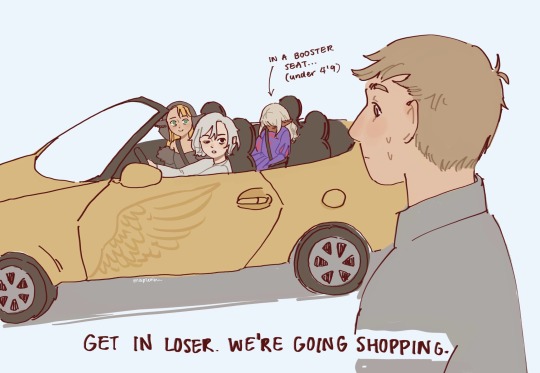
doungeon lourdes…
732 notes
·
View notes
Text
Oh another Rin fact is that it’s never explicitly stated what genders her parents are. I like to headcanon that she had two moms
18 notes
·
View notes
Text
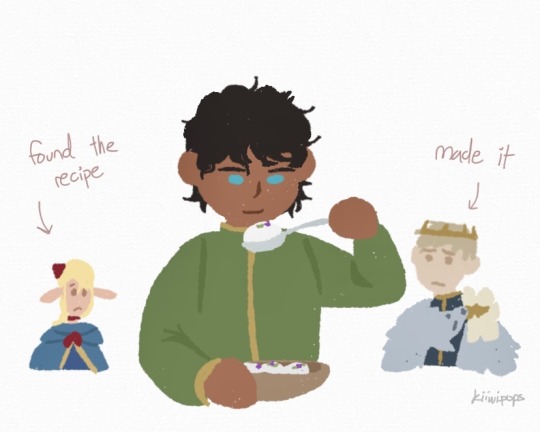

let that man have his rasgulla/rasbari!!
referencing that one daydream hour about sweets

#reblog#BWAAAA THEIR HAPPY FACES 🥺😭#I do so adore ‘get Kabru his hometown food in post canon’ stuff and this might be my favorite yet#bc it has Laios AND Marcille…. golden country trio!!!!! my beloveds!!#this is so so sweet the way you drew Marcille reminds me of the stylization page in one of the daydream hours#in a very good way
326 notes
·
View notes
Text
#i want to make a rin / kabru yuri comic and this will definitely help inform that
@loriache Please Tag Me If You Make A Rin/Kabru Yuri Comic Please
7 notes
·
View notes